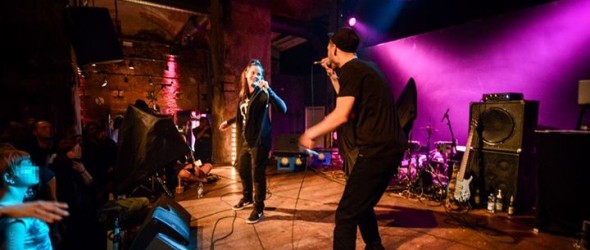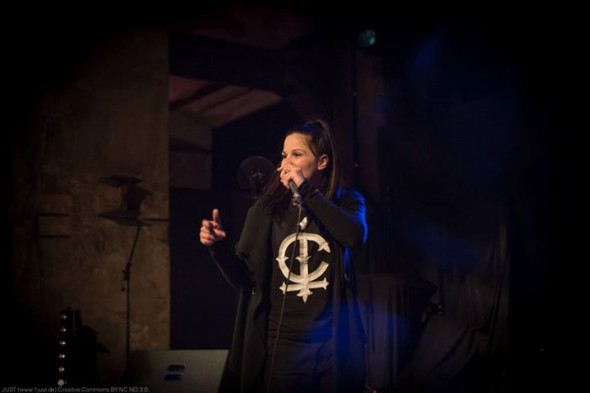Interview zum Konzert von Refpolk, Daisy Chain und DJ Kaikani
From a song to a revolution
von schnurr am 8. Mai 2015 veröffentlicht in Gespräche, Titelstory
Daisy Chain und Refpolk. Foto: Christina Palitzsch
An einem sonnigen Sonntag war das JuZI trotzdem gut gefüllt, denn Refpolk, Daisy Chain und DJ Kaikani waren für ein Konzert zu Besuch. Bereits am Nachmittag sprachen sie mit Interessierten über ihr Projekt „the future is still unwritten“. Nach dem Konzert haben wir nochmal mit ihnen gesprochen – auf englisch.
Die deutsch-griechische Hip Hop-Formation gibt sich politisch: Während des Konzerts kam es noch zu einem Feature mit dem Geflüchteten Jakou, der selber auch politischen Rap macht und Texte schreibt. Wir haben uns nach dem Konzert mit Daisy Chain und Refpolk getroffen und ein wenig geplaudert.
So the concert is over, what was your impression of it?
Refpolk: I liked it very much. It was on a sunday and was sunny outside so it took some time to get people into the vibe, but I liked it a lot because it was like a session. We left the stage, went down and were on the same level. Jakou came in spontaneously and performed a few parts.
Daisy Chain: In the beginning we were kind of lost on the stage so it was good to come down from our thrones to be with the poeple.
Do you often come down from the stage during a concert?
D: Sometimes we dont have the possibility to go down from the stage. As far as I’m concerend I love to be on the same level with the people and enjoyed it very, very much. It felt like a family. The place was very nice. The truth is, these types of concerts are where I perform the best. I feel comfortable with the people and that we are doing it all together, building something between us. The place is great, the people are great and the energy is great. Absolutely it changed when we went down.
In one of your interviews you said that hip hip is like a mirror of society..
R: I said that?
And do you think hip hop is changing now because of changes in society?
R: On the one hand, hip hop is a mirror of society but on the other it‘s often used by, for example, sexist rap artists to say things like “I’m just a mirror of society, I’m just saying what is happening.“ So this picture of hip hop as a mirror of society is sometimes used as an excuse that forgets that there are some possibilities to act and that everybody has a responsibility for what he or she is doing. Of course there is a close connection between hip hop and society in many ways and form. In my point of view, I think that hip hop and rap music in Germany is changing, especially in times of crisis. A lot of things are happening now: the IS, the PEGIDA, the racist marches, refugee protests. A lot of things are happening and we dont know which direction rap will go. That’s our responsibility in which direction it will develop in the next years.
D: I don’t like the phrase that hip hop is a mirror of society because I believe that it isn’t. If hip hop was like the society, I wouldn’t do hip hop. I connect to the mirror part, the reflection of how we live, but you have to do it and deal with it and this inspires us and gives us a direction to say no or yes, support something or not to support something. For example, if facists go up it’s not that we are a mirror of society but rather we take this opportunity to say no to facism, so it’s something like a reflection but a reflection with a solution and an opinion. It goes one step forward. I believe this is what we have to do to take the problems, the every-day part of life and put it into our lyrics to change society the way we want. So maybe it is a reflection, but we want us to be the mirror of a new society.
By your workshop “The future is still unwritten“, you want to push forward dialoges, interaction and communication between the countries. Did you already receive some feedback on that?
D: Yes, a lot of people support this and are inspired by it and do things from that. So it’s very important for us to keep the inspiration to others because it’s not that five people will save the world. Everyone has to do somthing to change the world. It’s a place where we can connect and we want to connect more people. We like this kind of communication because, as I said in the workshop, it’s something the we want to do. There are things that we want to change and when you want to change something you are a beginner, so you have to learn also. A connection is our number one priority of what we are trying to do and from it, we can learning from it. It’s not only to connect but also to learn how others act so each one of us can bring it to our country, to our struggles and to expand upon it to find more points of how to be together because it’s easier to fight together.

Daisy Chain schreibt ihre Texte über die politischen und gesellschaftlichen Probleme Griechenlands. Foto: Just Photographer Berlin
How is the feedback as a foreign hiphopper in the other countries with the background of the crisis with Greece and Germany?
R: People see me. When we were on tour a lot of people came to me and wanted to talk to me of the actions of the German government and the concequences of its actions towards the people in Greece. They want to talk about their decrease of salary or to say to me that it’s great that I, as someone from Germany, participating in this project and that it’s very important to have people in Germany as well standing up for something like “The future is still unwritten“. Naturally, I was seen as someting special, in a way, but as an activist and rapper people in “The future is still unwritten“ saw me as a comrade. And thats ok because that is the context from where I come.
Apart from that, musically it was important to play other songs in Greece, people did not understand the language, so I explained some songs and I focused on flow or fast raps and scratches from the DJ to make music on stage. That was important for me when I went back. The tour in Greece and Spain made me more..
D: Better.
R: Yeah. It gave me some experience in terms of music. It made me more a musician. It’s about music, it’s about emotions and passion when people don’t get the language but the music.
D: I think the same. When we are in another country and we don’t have the same language the only thing that we have is the music and the energy. Someone might not be able to understand what i’m saying but you see me serious or mad you understand that I’m emotionally close to what I’m saying. Everywhere people should understand what we are saying, especially people like me and Refpolk have a meaning in the lyrics- it’s not only fun and party.
For me the experince here was that I got a lot of support. As a beginner in Germany and as a beginner in Greece, I had more support in Germany. In Greece it’s more difficult to get people to accept you. I am a girl also. In Germany that makes it easier, I can see this. Although in Greece it makes it harder. You are a girl and you have to survive in the music scene of Greece. You have to give it all just to survive not just to be well known or something. Here, the scene is more open, also to girls. So you can be a beginner and be involved and you can grow step by step. Sure there were some cities where I didn’t feel a connection, but very rarely we didn’t find a way to interact.
Do you see yourselves more as a musician or as an activists?
R: Do I have to choose one? It’s working together. When I started rapping, that was the time I started being interested in what was happening in society, resistance and protest. It came together and it grew together. For me it’s linked. You can’t seperate it. Im rapping about what I’m doing, what I see and what people do around me. It’s very normal for me to rap about that kind of stuff.
D: More or less I agree with Refpolk. Music is a weapon. We use it as a weapon. Of course we celebrate music and the things that music brings to us. It’s a weapon to motivate and inspire people, to give them something to think about and to change their minds and their worlds when we rap about passionate things or society. I felt the same when I was younger and still do now when I find an artist or a song that inspires me. I take power from it and I’m not alone, we are doing this.
When did you start getting into music?
D: I was very small. From a radio station I found a CD, and I find out other similar bands, so from the cover and the special thanks I found other hip hop groups. There were not many others. When I started to hear that type of music I also started writing. In 2003 I recorded my first song. I wanted to be prepared. I never published something except some features until two years ago when I was involved in the scene and I knew more of the bands. We were friends because the hip hop scene was smaller and so we all knew each other. But I wanted to do something and have a message to give. And then I made the album “Weapon of Choice“ and I brought it to public.
How did you meet each other?
R: It was an idea of the three of us-Kronstadt, Daisy Chain and me. Rap Militante Internationale is a project of artists who lived in Italy at the time. They have been connected through a lot of acts in different countries. And also to Miss Zebra, Daisychain, Kronstadt & DJ KaiKani and me so we came together because of them.
That was the common ground to find together, to meet cause of concerts, to detect their music and to notice I like their music and the message and feelings. I think I had this idea in mind of writing a song about the struggles against rising rents and evictions in Spain and Germany. It was the idea with Kronstadt to write a song about this. But somehow we were “ok, lets go more in the direction of anticapitalism and crisis“. Thats how we asked Daisy Chain and Miss Zebra. It was step by step, it was not like “there is crisis, there is capitalism, there is the dominant role of Germany and protests in Greece and Spain- let’s write a song“. It was step by step, so it was kind of natural what is important to me.
D: But its great that it started with a song. From a concert to a song from a song to what we are doing now and where we want to go.
R: From a concert to a song, a song to a tool, a tool to a movement and from a movement to revolution. And from revolution to paradise.
Weiterführende Links:
http://www.unwritten-future.org/







